By definition, a guideline is an indication or outline of policy or conduct. In other words, a guideline is a statement by which to determine a course of action.
It aims to streamline particular processes according to a set routine or sound practice.
Hence, rapidly changing instructions do not qualify to be termed guidelines. And this is exactly what is happening, especially in the case of testing for COVID-19.
The Indian Council of Medical research (ICMR) revised its testing norms on 10 January 2022, ostensibly to facilitate early detection of symptomatic cases for quick isolation and care, especially in elderly and individuals with comorbidities.
However, in community settings, recommendations are only to test symptomatic patients with at least one of the symptoms of cough, fever, sore throat, loss of taste and/or smell, breathlessness and/or other respiratory symptoms; at-risk contacts of laboratory confirmed cases viz contacts who are elderly and individuals with comorbidities such as diabetes, hypertension, chronic lung or kidney disease malignancy or obesity etc.
Finally, individuals undertaking international travel or those arriving at Indian ports of entries should also undergo testing for COVID-19, it says.
Similarly, in hospital settings, it goes on to say, that testing may be undertaken as per discretion of the treating doctor with the considerations that no emergency procedure including surgeries and deliveries should be delayed for lack of a test; patients should not be referred to other facilities for lack of a testing facility; most importantly, asymptomatic patients undergoing surgical/non-surgical invasive procedures including pregnant women in/near labour who are hospitalised for delivery should not be tested unless warranted or symptoms develop.
What is a little surprising is the recommendation that asymptomatic individuals in community settings, individuals undertaking interstate domestic travel and contacts of patients, unless identified as high-risk based on age or comorbidity, do not need COVID testing.
It specified, however, that the advisory is generic in nature and may be modified as per discretion of the state health authorities.
It appears that these guidelines for testing are dictated not by the scientific evidence but by the compulsions of logistics.
The reason is not difficult to understand. Because of a very high transmissibility and a low doubling time, the new omicron variant is spreading like wildfire and this would stretch and completely overwhelm the testing facilities if the previous guidelines to maximise testing are followed.
But for the same reason, if the testing is not done, a large pool of infected but undetected, asymptomatic people would help the disease spread beyond control. Hence, it defies logic to permit interstate travel undertaken by untested people.
Similarly, in the healthcare facilities, during the second wave patients were triaged and not allowed admission in the hospital or to undergo surgery or a procedure until testing negative for COVID-19.
This was to safeguard other patients in the hospital and the healthcare staff.
In fact, this practice is continuing even now in most hospitals including several government hospitals.
Another advisory which seems to be irrational, is "Regular quarantine of health care workers after performing duty in COVID-19 areas is not warranted".
This not only puts the health and life of the already overburdened doctors and staff nurses at peril but also of their families.
Further, while taking care of COVID-positive patients, there are high chances of cross-infection from the doctors and staff exposed to the infection, to the COVID-negative patients, more so because the latter have reduced immunity due to several underlying conditions.
By not testing thus, one is already contributing to diminishing an already depleted pool of healthcare workers whose health is currently the most important factor in sustaining the already overburdened healthcare delivery system.
(Dr Ashwini Setya is a Senior Gastroenterologist and Programme Director in Delhi’s Max Super Speciality Hospital. He endeavours to help people lead a healthy life without medication. He can be reached at ashwini.setya@gmail.com. This is an opinion piece. The views expressed above are the author’s own. The Quint neither endorses nor is responsible for them.)
